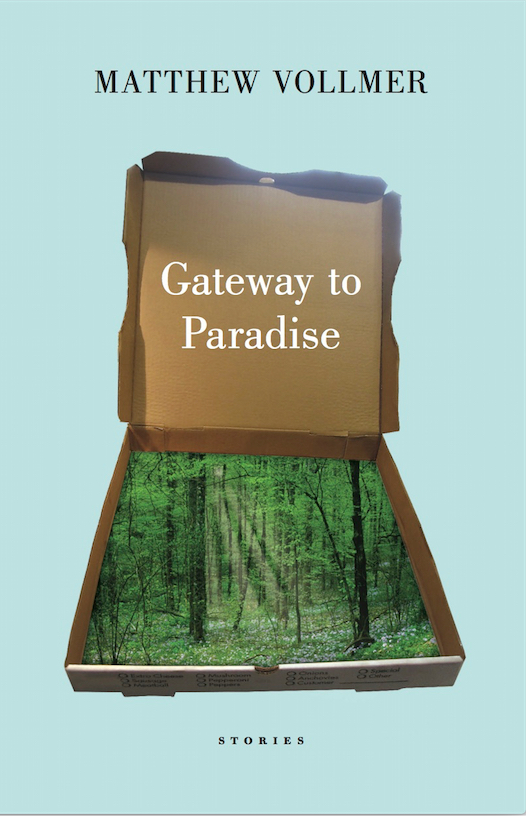 An analgesic affair ends in supernatural pain for a small-town dentist; a beleaguered young writing professor does his best, edgiest work on an older, alluring literary star; a woman tests her husband’s love against her loyal dog’s. In the novella-length title-story, a young couple leave an ice-cream sundae melting at a crime scene. Trust fraying on the run, Riley is forced to confront her self-deception in a surreal candyland.
An analgesic affair ends in supernatural pain for a small-town dentist; a beleaguered young writing professor does his best, edgiest work on an older, alluring literary star; a woman tests her husband’s love against her loyal dog’s. In the novella-length title-story, a young couple leave an ice-cream sundae melting at a crime scene. Trust fraying on the run, Riley is forced to confront her self-deception in a surreal candyland.
In Gateway to Paradise, Vollmer surpasses the promise of his first collection, acclaimed as “Irresistible… utterly convincing…the arrival of a strong new voice.” (New York Times Book Review), “a rare and gratifying achievement,” (Library Journal, starred) and as Charles D’Ambrosio said of Future Missionaries of America, “[this collection] has more range than most novels while doing brilliantly what stories do best: it deepens the mystery of others by making that mystery familiar,” Vollmer’s new book explores the confrontation with desire as a path to self-actualization.
“These outlandish short stories centered in the Appalachian South chronicle the lives of characters as distinct and magnetic as the region they inhabit.” – Shelf Awareness
“What works so well and uniquely in Gateway is the marriage of thought and behavior, thought and consequence. In ‘The Visiting Writer,’ the best story I have ever read about bookish jealousy and presumption, ‘an untenured professor’ who ‘depended on a world of illusions to sustain [his] artistic legitimacy,’ is picking up a visiting writer of note, to speak and read at his employing university. She, the visiting writer, ‘was of a different ilk.’ Although, ‘despite having been a finalist for the Pulitzer, the National Book Award, the National Book Critic’s Circle Award, and the PEN/Faulkner, it was safe to say that her name would not have rung the average American reader’s bell. Yet among readers of so-called literary fiction, she was well known.’ Critics had focused on her ‘preoccupation with violence and sexual deviance.’ The narrator also mentions how ‘she worked in her youth as an exotic dancer and prostitute.’ His constant emotional vacillation wavers between passive aggression and titillation. So much so that he convinces himself an affair is all but inevitable. Little happens in the story, least of all sex. Instead we eavesdrop on his vulnerable, presumptuous, often inappropriate, sometimes contradictory, and occasionally petty thought process. More, we are forced to think of the writer of ‘the writer’ (Vollmer), and, worse, we are forced to hazard a guess (at least I was, anyway) of what writer the visiting writer might be based. What might have come off as ‘uber-meta’ (two prefixes that should never be linked ever again) is instead brilliantly cruel, uncomfortably funny, and revelatory. After finishing, I felt nothing short of indicted. As far as I’m concerned, that means a very good read.” —Brooklyn Rail.